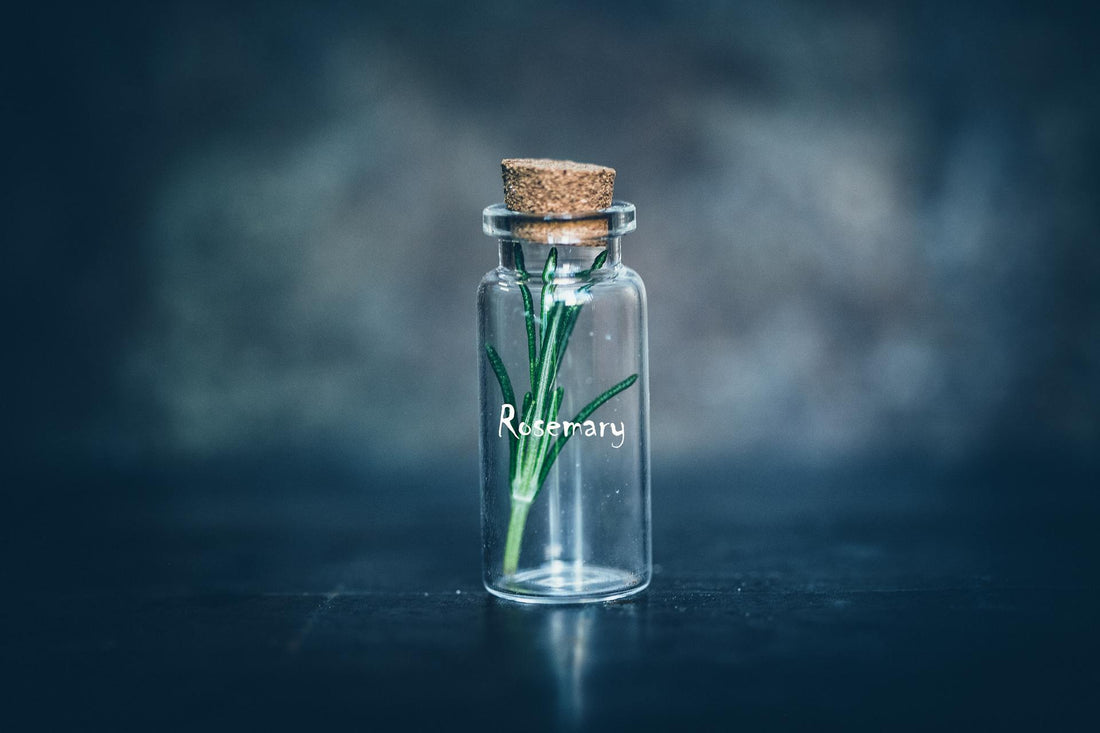When it comes to natural remedies for hair growth, rosemary has been a standout herb for centuries. Its benefits are well-documented, but not all forms of rosemary deliver the same results. In this blog, we'll explore the advantages of rosemary for hair growth, why rosemary extract might be more effective than rosemary oil, its resemblance to the well-known hair growth treatment minoxidil, and the best ways to use it for thinning hair. We'll also discuss why boiling fresh rosemary in water is not the most effective method and share how to use it properly to create your homemade serum.

Rosemary for Hair Growth
Rosemary is celebrated for its myriad benefits, particularly in promoting hair growth. The herb is packed with antioxidants, anti-inflammatory compounds, and essential nutrients that can nourish the scalp and hair follicles. Key benefits of rosemary for hair include:
- Stimulating Hair Growth: Rosemary enhances blood circulation to the scalp, providing hair follicles with essential nutrients and oxygen.
- Reducing Hair Loss: It can help prevent hair thinning and hair loss by strengthening hair roots.
- Combating Dandruff: The antimicrobial properties of rosemary can reduce dandruff and scalp irritation.
- Improving Hair Thickness: Regular use can lead to thicker and fuller hair over time.

Rosemary Extract vs. Rosemary Oil
While both rosemary extract and rosemary oil are beneficial for hair, research suggests that rosemary extract might be more effective for hair growth. Here's why:
- Concentration and Stability: Rosemary extract is typically more concentrated and stable than the oil, ensuring a consistent and potent delivery of active compounds.
- Ease of Use: Extracts can be more easily incorporated into hair care products and treatments, providing a more uniform application.
- Less Risk of Irritation: Essential oils, including rosemary oil, can sometimes cause skin irritation if not properly diluted. Extracts are generally gentler on the scalp.

Techniques to Obtain Rosemary Essential Oil and Extract
Rosemary Essential Oil
Rosemary essential oil is obtained through steam distillation. Here's a brief overview of the process:
- Harvesting: Fresh rosemary leaves are harvested and cleaned.
- Distillation: The leaves are placed in a distillation apparatus where steam is passed through them. The heat and steam release the essential oil from the plant material.
- Collection: The steam carrying the essential oil is condensed back into liquid form, where the oil and water separate. The essential oil is then collected from the top.

Rosemary extract is typically obtained through solvent extraction. Here's how it's done:
- Harvesting: Fresh or dried rosemary leaves are harvested and cleaned.
- Extraction: The leaves are soaked in a solvent (such as ethanol) to dissolve the desired compounds (in this case the Carnosic Acid).
- Filtration: The mixture is filtered to remove solid plant material, leaving behind a concentrated liquid extract.
- Evaporation: The solvent is then evaporated, resulting in a concentrated extract rich in active compounds.


The Active Compound in Rosemary: Carnosic Acid
The active compound in rosemary that has been found to promote hair growth similarly to minoxidil is carnosic acid. This compound has powerful antioxidant and anti-inflammatory properties, making it beneficial for scalp health and hair growth. This active compound is soluble only in oil or solvent therefore the distillation technique is not the best to extract it from the herb.
Carnosic Acid in Oil vs. Extract
- Rosemary Essential Oil: Contains volatile compounds like 1,8-cineole, camphor, and alpha-pinene, with smaller amounts of carnosic acid. These compounds contribute to the oil’s overall benefits but differ in concentration and effect from the extract.
- Rosemary Extract: Richer in carnosic acid compared to the essential oil, making it more effective for targeting hair growth and scalp health directly.

Scientific Evidence: Rosemary vs. Minoxidil
Minoxidil is a well-known over-the-counter treatment for hair loss. Interestingly, scientific studies have shown that rosemary can be just as effective as minoxidil in promoting hair growth. A study published in 2015 compared the efficacy of rosemary oil to minoxidil 2% in treating androgenetic alopecia (male or female pattern baldness). After six months, both groups showed significant hair growth, but the rosemary oil group experienced fewer side effects like scalp itching.

Why Boiling Fresh Rosemary in Water Isn't Effective
While boiling fresh rosemary in water might seem like a natural and straightforward method to harness its benefits, it is not the most effective. Here’s why:
- Loss of Active Compounds: The boiling process can cause the loss of volatile compounds that are crucial for hair growth.
- Low Concentration: Boiling does not extract the essential oils and active ingredients in a concentrated form, leading to a less potent solution.
- Solubility of Carnosic Acid: Carnosic acid, the active compound in rosemary that promotes hair growth, is not water-soluble. This means it cannot be effectively extracted by boiling in water. Instead, it is soluble in organic solvents like ethanol and in oils, which is why these methods are more effective for extracting carnosic acid.
- Short Shelf Life: Infusions made by boiling fresh herbs often have a short shelf life and can quickly lose their effectiveness.

The Best Way to Use Rosemary for Thinning Hair
The most effective and safest option is to buy a product formulated by experts that contains rosemary extract. These products ensure the right concentration of active compounds and minimize the risk of irritation. Expert formulations are typically designed to provide optimal benefits for hair growth. See our oil here.
If this is not available, you can always make your own oil following theses steps:
- Get Fresh Rosemary: Start with fresh rosemary leaves.
- Dry the Rosemary: Dry the leaves until they become crunchy.
- Infuse in Oil: Infuse the dried rosemary leaves in a carrier oil (such as olive oil or jojoba oil) to extract the carnosic acid.
- Apply and Massage: Apply the rosemary-infused oil onto the scalp and massage gently to stimulate blood circulation and promote hair growth.

Conclusion

